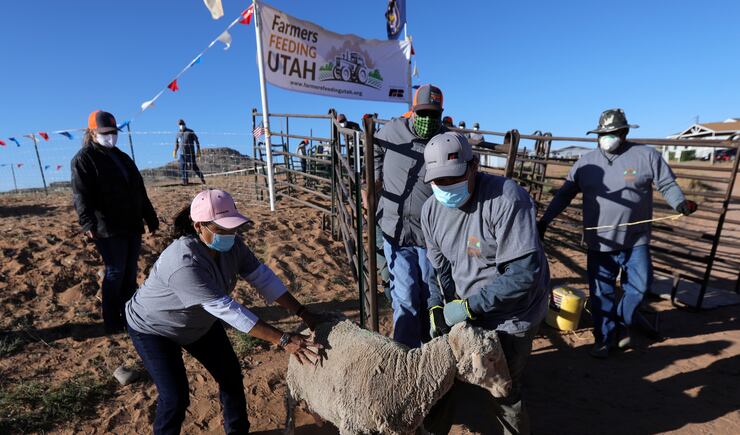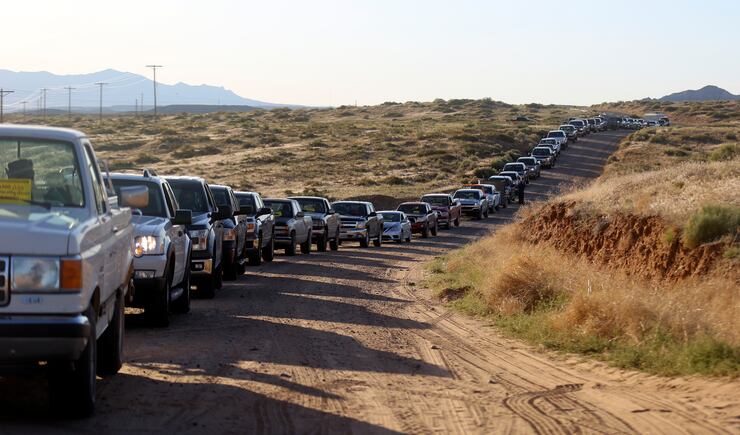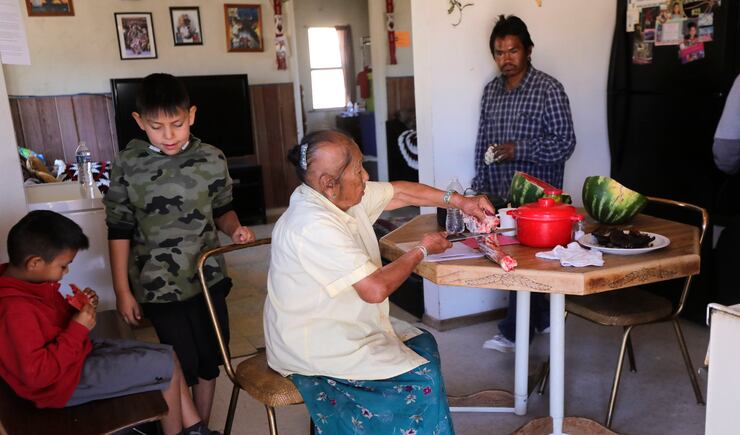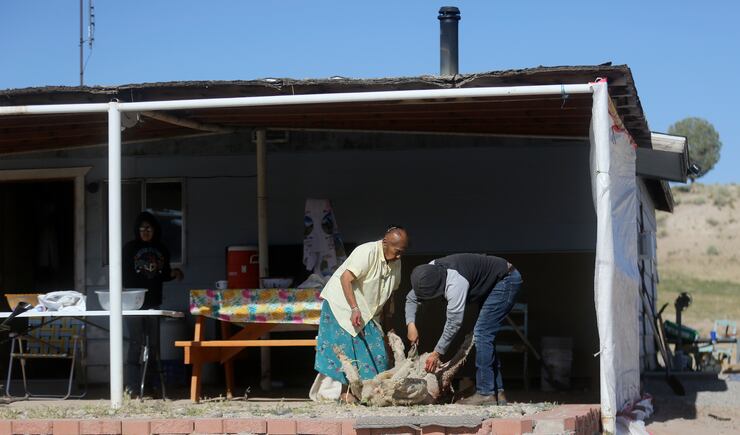MONTEZUMA CREEK, San Juan County — Sharmita Benally doesn’t know Bill Robinson, but for a few sacred moments, the two strangers were connected by the animal they both love.
It was the suffering of another man, Ron “Milkman” Gibson, that created the thread that would stitch their lives together, however briefly, in a very significant way.
Robinson raised and owned the sheep that made its way from Fairview in Sanpete County via Colorado to Montezuma Creek where the sheep was given to Benally’s grandmother, Anna Martin, as part of a program called Farmers Feeding Utah dreamed up by Gibson and the Utah Farm Bureau.
“All of our channels to sell our products have been severely hampered through this whole coronavirus,” Gibson said. “Over 50% of the food that we normally produce goes to food service — restaurants, hotels, cruise ships and amusement parks. We definitely picked up some of our demand in grocery stores, but we didn’t replace 50% of sales.”

Gibson said the sheep industry was among the hardest hit.
“We were racking our brains about how we could try to help our producers,” Gibson said. “This idea came up that we could try to raise money and give that money to agricultural producers, buy their products directly, and then take that money and give it to people that were in need.”
A month ago, it looked like sheep farmers were going to take catastrophic losses. They weren’t alone as the fraying of the supply chain left farmers with excess produce and consumers scrambling and unable to find many products. Milk was dumped, vegetables plowed under and egg and pork producers begged for help.
And then, somewhere amid the conversations and strategy sessions, inspiration struck.
“We launched this program,” Gibson said, watching some of his colleagues arrange two chutes so they could load sheep into every kind of vehicle imaginable. “And due to the kindness and generosity of so many people in Utah, here we are today putting that effort to work.”
Part of that effort is the delivery of 305 sheep given to families who were selected by a group led by Montezuma Creek resident and former San Juan County Commissioner Rebecca Benally.
“Today, I’m a community member who just wants to help my community at a grassroots level,” said Benally, who is one of seven members of a federal advisory board that represents 574 tribes when it comes to issues the Treasury Department.
“At first I wasn’t sure because, well, just the thought of intruding on people’s homes and things like that. But then I thought, you know, this sheep will probably bring home, bring some sort of resilience, and then I thought maybe they could feel better to know that somebody cares. That’s when I decided I would do it.”
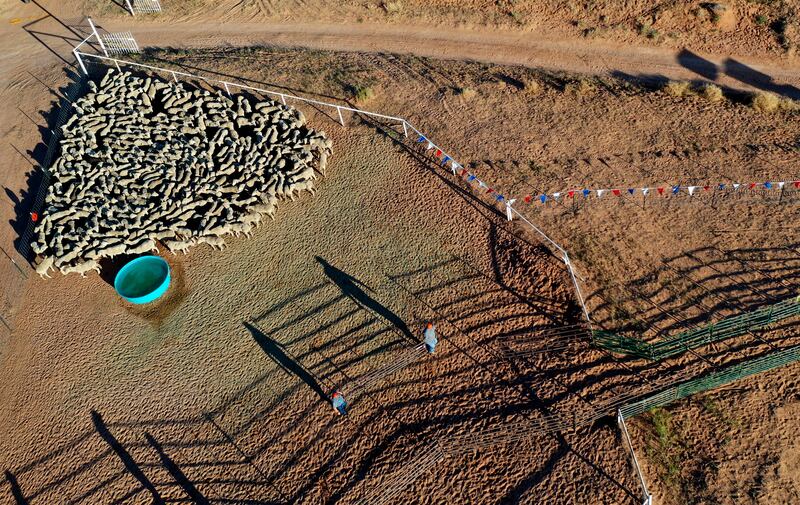
The sheep spent the night on her property, and Gibson, Benally and their families and colleagues spent a recent day matching sheep with families. A local medicine man, 81, came and blessed the sheep as soon as they arrived.
“It was emotional,” Rebecca Benally said. “He wanted to see sheep. He’s 81 years old, and he said probably the last time he saw sheep was probably 20 years ago. He had a tear in his eye. So it’s not just food. He remembered the time when he was a little boy, and he said he has health problems now, and just seeing the sheep and remembering his youth, it brought so much happiness for him.”
Fighting back her own tears, she said they got him some water and a chair, and he just watched the sheep be unloaded.
“Once they were unloaded, he walked to the edge of the fence,” she said. “And he blessed them. ... He said, ‘In prosperity, while I remain on this earth, I will be happy.’”
Benally apologizes for her emotion, but she says she knows what this gift means, especially to the elders. Sadly, she told the elders not to come to the distribution because they are at greatest risk of succumbing to COVID-19. Still, she said, some couldn’t resist and “had to see for themselves because they can’t believe who would give everyone free sheep.”
The distribution begins after the sheep song but before the final prayer is offered.

“It’s crazy,” Gibson said of the speed with which the program has been able to actually impact people’s lives. “But it’s so exciting that today we’re actually here seeing our work and the work of Rebecca and everybody seeing that work here. And look at the line (which stretched onto the highway before dawn). ... We’re going to be able to make a difference in people’s lives today.”
Among those families impacted was that of 88-year-old Anna Martin. Her son-in-law, Raye Sandoval, picked up the sheep given to her, and when he arrived at their picturesque enclave of houses, Martin sat at a picnic table covered in a brightly covered plastic table cloth talking with her daughter, Doris Sandoval, as she made tortillas for the eventual feast.
For Benally, the donated sheep, which they unload and lay near the table where Martin sits, will provide more than a few meals. It will provide the matriarch and her family an opportunity to engage in traditions that tie them to ancestors they’ve never met and traditions they struggle to keep alive in today’s modern world.
“A lot of her teaching goes into how to go about life,” Benally explains as her grandmother prepares the knives the three women will use to butcher the sheep that will be the center of the family’s celebration on a sweltering Monday. “From harvesting to caring for animals, because long ago that’s all they pretty much knew.”

She said her grandmother taught her that everything they do — from what they consume to how they live — is connected.
“I guess I learned from her to always be gracious from where you are, and about the land and what it gives you and your animals,” said the 28-year-old. “If you take care of both, then it will take care of you.”
While Doris Sandoval cooks bread and stirs the coals that will roast the feast, she explains that the sheep is sacred to Navajo people.
“I’m preparing the bread that we put the mutton on,” she said, noting that her mom prepared the dough before Raye even left to pick up the sheep in his two-tone brown Chevrolet pickup. “We haven’t had any mutton for a while ... so it’s a festival. It means a lot to us. It means inviting the neighbors, the family, it makes us happy. It’s our enjoyment.”
A family butchers a sheep on special occasions, she explains, after explaining how they lost some of the sheep they were raising after getting some bad hay, and how the COVID-19 outbreak on the Navajo Nation — one of the worst in the country — hasn’t impacted them directly, but it has impacted them economically.
“The baby’s first laugh, we’ll butcher a sheep,” Doris Sandoval said. “Birthdays, special occasions, that’s when we have mutton. We don’t have it very often.”
She turns away from the butchering, briefly talking to her youngest son. Then she returns to her fire.
“So it’s really nice of them, whoever donated it,” she said. “We really appreciate it.”
A week before Gibson helped distribute 305 sheep, frozen meat was distributed at the food bank in Blanding using a similar screening process, he said. That meat came from the farm of Drew Jorgensen, a seventh generation sheep rancher who said the situation got so bad, insurance companies stopped selling insurance to farmers.
“Insurance will cover our break even costs,” Jorgensen said. “But the market dropped so fast, they quit offering insurance. We got less than half of ours covered. ... We weren’t sure what to do. We didn’t know how long it would last, how far the market was going to go down, so we just watched it for a couple of weeks.”

When the asking price dropped by a third, Jorgensen decided to freeze what he had rather than take massive losses.
“We knew it was going to be bad, but we didn’t know it would be that bad,” he said. “We decided to keep looking. The more we looked, the worst things got.”
They approached major grocery chains like Costco to see if they’d buy the meat they had frozen, which is only good for about a year.
“Their buyer said they only buy from Australia,” Jorgensen said. “They said the U.S. couldn’t produce enough lamb to cover what they need. My feeling is, it would have been cheaper to buy from us, and get the rest of what they needed from Australia.”
Gibson hopes that one of the silver linings the COVID-19 outbreak will provide is that people are more aware of the food chain and what it takes to keep local farmers in business. A week after distributing sheep on Memorial Day, the Utah Farm Bureau announced another initiative that will feed families in Cache Valley, an area that recently had a spike in COVID-19 cases.
With northern Utah food pantries empty, Gibson hopes donations will allow them to buy products from local farmers to donate to needy families throughout the area. One Utah-sourced meal is just $5, and so far they’ve raised about $26,000 of their $150,000 goal. Donations are accepted at farmersfeedingutah.org.
Nearly 300 miles from where Jorgensen and his wife try to find ways to stay afloat, Anna Martin gets up early to make dough and prepare for the daylong celebration that will begin with one of his sheep.
Benally said the butchering process begins with prayers.
“She’s always telling us about like small prayers to being with, even just a couple of words,” Benally said. “That means for us to feed off the animal that gives us a lot from bedding to nurturing the body and soul. There is always something about Navajos and sheep. ... It’s kind of like a fix. You can eat all kinds of meat for so long, and then sometimes, it’s like, ‘I don’t want to eat beef, chicken, pork, whatever.’
“And sometimes we kind of stop eating, because for some reason our soul wants mutton, which is like a medicine for our body and soul. We eat it and we feel relieved. We feel like we woke up. Our soul woke up, and we’re strong again.”

Martin cuts as much as she can, and then she sits down to direct her granddaughters. Benally said after the butchering is finished that she would have done a few things differently, but her grandmother directed everything, explaining as they worked. She even reminded them that they don’t speak ill about an animal that’s given its life to sustain their lives.
As Doris Sandoval sets the tortillas aside, her mother begins to hand her sections of meat to begin roasting. Relatives living nearby come over to be a part of the moment. Others call and let them know they’ll be by later to enjoy the feast.
To buy a sheep, she said, is expensive — about $200. So a morning spent in celebration of traditional ways is something they cherish even more as COVID-19 has ravaged so much of their community and halted many of their celebrations.
“I’m just so grateful for whoever donated these sheep,” she said, after talking about how grateful they are to be spared from the COVID-19 outbreak. “I prayed about it this morning. I prayed that they will be blessed even more.”
